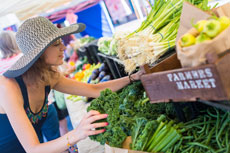Tip: Take advantage of the year’s most delicious produce, get to know the farmers who grow your food, and nourish yourself and your family by frequenting your local farmers market.

By the Chef Marshall O’Brien Group
For those who swoon over fresh, delicious fruits and vegetables, there is no happier place than the farmers market during summertime. Often picked locally at peak ripeness the morning you buy it, produce from a farmers market is among the most flavorful and nutritious you will ever taste. Our recipe for Bowtie Pasta with Roasted Tomatoes and Broccolini is a great way to enjoy these fresh flavors. Farmers markets provide an opportunity to learn about fruits and vegetables you may have never seen before, talk directly with the farmers who grow your food, and nourish yourself and your family. Follow these tips to make the most of your trip to the farmers market and properly store your bounty so it stays fresh until you have enjoyed the last tasty bite.
Farmers Market Tips
Make the most of your trip to the farmers market with these tips:
- Bring reusable bags and money in small denominations.
- Shop early to get the best selection – the most desirable produce may sell out well before lunchtime.
- For a deal, shop the market just before it closes – or in bad weather.
- Survey the entire market before buying anything to get an idea of what is available and how vendors are pricing their produce.
- If produce is packaged in quantities too large for your household, some farmers will split trays. Or share what you buy with a neighbor!
- Try something new – one advantage of visiting the market is learning about new fruits and vegetables.
- The locally grown fruits and vegetables available vary throughout the growing season. Lettuces grow better in the cool spring and fall months, tomatoes begin to appear mid-summer and hard squash are available toward the end of the season.
- Not sure what to do with that tatsoi (Chinese cabbage) you just bought? Ask the farmer who grew it how they like to prepare it or visit your farmers market’s website – many offer recipes for produce currently in season.
- Talk to farmers about how they grow their produce. While not all fruits and vegetables sold at farmers markets are certified organic, many smaller farms that cannot afford the costly organic certification use organic practices.
- Not everything is nourishing at the farmers market. Pastries, bagels and other treats may be yummy – but don’t be tricked into thinking they are healthy just because you bought them at the farmers market!
Keep Produce Fresh
When you leave the market with an abundance of fresh produce, proper storage will extend its shelf life and ensure none goes to waste.
- Rinse and dry salad greens as soon as you get home – you are more likely to enjoy your greens when they are in your refrigerator prepped and ready to be eaten.
- Store fruits separate from vegetables – many fruits give off high levels of ethylene, a gas that causes other fruits and vegetables to ripen (and spoil) faster. When you want to speed ripening, place unripe fruits or vegetables in a paper bag with a banana or apple.
- Stone fruits, melons, apples and pears continue to ripen if left sitting on the countertop. Slow their ripening by storing them in the refrigerator.
- Wash fresh berries just before using. If you have more berries than you can use immediately, freeze them in a single layer on a cookie sheet and transfer the frozen berries to plastic bags for longer-term freezer storage. The frozen berries are a great addition to smoothies!
- Most vegetables should not be rinsed until you use them. Remove all rubber bands and ties, trim leafy ends, and store veggies loosely in the crisper drawer of your refrigerator.
- Leafy herbs stay fresh longest when you snip their ends, place in a jar of water, cover with a loose plastic bag and refrigerate. Keep basil out of the refrigerator – its leaves turn black in the cold. If you cannot use herbs while fresh, dry them for use over the coming months. Because dried herbs are stronger, use one-third the amount: substitute one teaspoon of dried for one tablespoon of fresh herbs.
- Vegetables like potatoes, onions, garlic, and winter squash keep through the winter when stored in a cool, dry, dark place. Potatoes turn sweet when stored in the refrigerator.
- Store potatoes and onions separately. When stored together, they give off gases that will cause both to spoil.
- Tomatoes should be stored on the counter. Refrigeration damages the cell walls and makes their texture mealy and the cold also deactivates enzymes that gives them their great flavor.
Visit Your Local Farmers Market
Once you have tasted freshly picked strawberries or local asparagus, you will wish farmers market season lasted throughout the entire year. Take advantage of the spectacular bounty of summer. Visit Local Harvest to find the farmers market nearest you and enjoy delicious, fresh, nourishing meals all season long.
You will love the way you feel!
 The Chef Marshall O’Brien Group is a dedicated assembly of professionals based in Minneapolis, Minnesota, committed to the goal of using nutrition to get kids and families to lead happier, healthier lives.
The Chef Marshall O’Brien Group is a dedicated assembly of professionals based in Minneapolis, Minnesota, committed to the goal of using nutrition to get kids and families to lead happier, healthier lives.